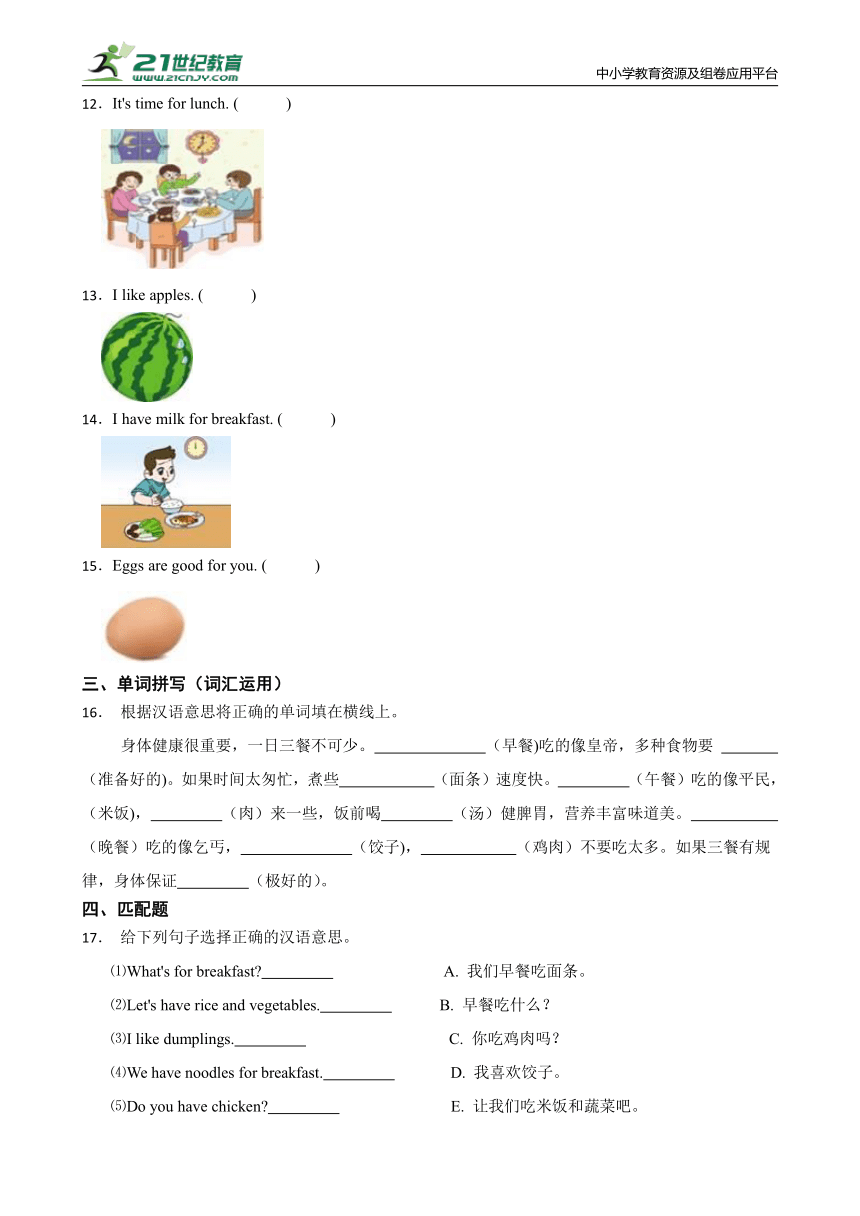Unit 3 What's for Breakfast? 一课一练 (含答案)
文档属性
| 名称 | Unit 3 What's for Breakfast? 一课一练 (含答案) |

|
|
| 格式 | docx | ||
| 文件大小 | 132.5KB | ||
| 资源类型 | 试卷 | ||
| 版本资源 | 陕旅版 | ||
| 科目 | 英语 | ||
| 更新时间 | 2023-07-07 22:08:00 | ||
图片预览


文档简介
中小学教育资源及组卷应用平台
Unit3 一课一练
一、单选题
1. 当你家里人很少吃某种食物时,你可以说:( )
A.No, we don't. B.Hello! C.Very little.
2. I like ____ very much.
A.noodle B.dumpling C.soup
3. 向对方表示感谢时,你可以说: ( )
A.Thank you. B.Good morning. C.Look.
4. 今天的晚餐非常丰盛,刘朝阳很高兴,他可以说: ( )
A.Very little. B.No. C.Very good.
5. They're ____.
A.apples B.apple C.a apple
6. —____ for breakfast
—Some bread and milk.
A.Where's B.What's C.Who's
7. We have rice and meat ____ dinner.
A.in B.on C.for
8. Do you have dumplings ____ home
A.in B.at C.on
9. 你想知道午餐吃什么,你可以说: ( )
A.What do we have for lunch
B.Great!
C.Really
10. 朋友来到自己家里做客,你对他们表示欢迎,你可以说:( )
A.Thank you. B.Welcome! C.OK.
二、判断题
11.We have rice for lunch.( )
12.It's time for lunch. ( )
13.I like apples. ( )
14.I have milk for breakfast. ( )
15.Eggs are good for you. ( )
三、单词拼写(词汇运用)
16. 根据汉语意思将正确的单词填在横线上。
身体健康很重要,一日三餐不可少。 (早餐)吃的像皇帝,多种食物要 (准备好的)。如果时间太匆忙,煮些 (面条)速度快。 (午餐)吃的像平民, (米饭), (肉)来一些,饭前喝 (汤)健脾胃,营养丰富味道美。 (晚餐)吃的像乞丐, (饺子), (鸡肉)不要吃太多。如果三餐有规律,身体保证 (极好的)。
四、匹配题
17. 给下列句子选择正确的汉语意思。
⑴What's for breakfast A. 我们早餐吃面条。
⑵Let's have rice and vegetables. B. 早餐吃什么?
⑶I like dumplings. C. 你吃鸡肉吗?
⑷We have noodles for breakfast. D. 我喜欢饺子。
⑸Do you have chicken E. 让我们吃米饭和蔬菜吧。
五、排序题
18.给下列句子排序。
Good morning, Mom.
What's for breakfast, Mom
Good morning, Betty.
Bread, eggs and oranges.
I like them.
六、情景交际
19.给下列句子选择合适的答语。
A. No, I don't. B. Great! C. They have a small farm. D. Bread and milk. E. Good morning.
(1)Good morning. ( )
(2)Do you have breakfast ( )
(3)What's for breakfast ( )
(4)What do they have ( )
(5)Let's have lunch. ( )
答案部分
1.C
2.C
3.A
4.C
5.A
6.B
7.C
8.B
9.A
10.B
11.(1)正确
12.(1)错误
13.(1)错误
14.(1)错误
15.(1)正确
16.breakfast;ready;noodles;lunch;rice;meat;soup;supper/dinner;dumplings;chicken;great
17.B;E;D;A;C
18.1;3;2;4;5
19.(1)E
(2)A
(3)D
(4)C
(5)B
Unit3 一课一练
一、单选题
1. 当你家里人很少吃某种食物时,你可以说:( )
A.No, we don't. B.Hello! C.Very little.
2. I like ____ very much.
A.noodle B.dumpling C.soup
3. 向对方表示感谢时,你可以说: ( )
A.Thank you. B.Good morning. C.Look.
4. 今天的晚餐非常丰盛,刘朝阳很高兴,他可以说: ( )
A.Very little. B.No. C.Very good.
5. They're ____.
A.apples B.apple C.a apple
6. —____ for breakfast
—Some bread and milk.
A.Where's B.What's C.Who's
7. We have rice and meat ____ dinner.
A.in B.on C.for
8. Do you have dumplings ____ home
A.in B.at C.on
9. 你想知道午餐吃什么,你可以说: ( )
A.What do we have for lunch
B.Great!
C.Really
10. 朋友来到自己家里做客,你对他们表示欢迎,你可以说:( )
A.Thank you. B.Welcome! C.OK.
二、判断题
11.We have rice for lunch.( )
12.It's time for lunch. ( )
13.I like apples. ( )
14.I have milk for breakfast. ( )
15.Eggs are good for you. ( )
三、单词拼写(词汇运用)
16. 根据汉语意思将正确的单词填在横线上。
身体健康很重要,一日三餐不可少。 (早餐)吃的像皇帝,多种食物要 (准备好的)。如果时间太匆忙,煮些 (面条)速度快。 (午餐)吃的像平民, (米饭), (肉)来一些,饭前喝 (汤)健脾胃,营养丰富味道美。 (晚餐)吃的像乞丐, (饺子), (鸡肉)不要吃太多。如果三餐有规律,身体保证 (极好的)。
四、匹配题
17. 给下列句子选择正确的汉语意思。
⑴What's for breakfast A. 我们早餐吃面条。
⑵Let's have rice and vegetables. B. 早餐吃什么?
⑶I like dumplings. C. 你吃鸡肉吗?
⑷We have noodles for breakfast. D. 我喜欢饺子。
⑸Do you have chicken E. 让我们吃米饭和蔬菜吧。
五、排序题
18.给下列句子排序。
Good morning, Mom.
What's for breakfast, Mom
Good morning, Betty.
Bread, eggs and oranges.
I like them.
六、情景交际
19.给下列句子选择合适的答语。
A. No, I don't. B. Great! C. They have a small farm. D. Bread and milk. E. Good morning.
(1)Good morning. ( )
(2)Do you have breakfast ( )
(3)What's for breakfast ( )
(4)What do they have ( )
(5)Let's have lunch. ( )
答案部分
1.C
2.C
3.A
4.C
5.A
6.B
7.C
8.B
9.A
10.B
11.(1)正确
12.(1)错误
13.(1)错误
14.(1)错误
15.(1)正确
16.breakfast;ready;noodles;lunch;rice;meat;soup;supper/dinner;dumplings;chicken;great
17.B;E;D;A;C
18.1;3;2;4;5
19.(1)E
(2)A
(3)D
(4)C
(5)B
